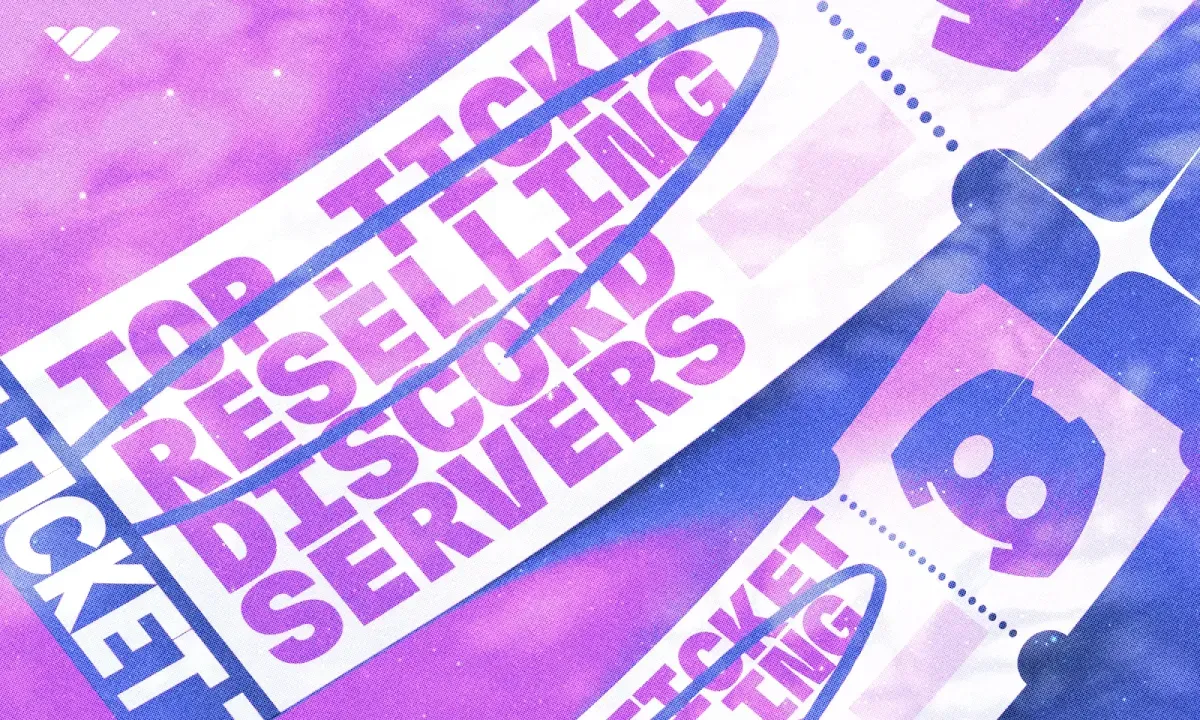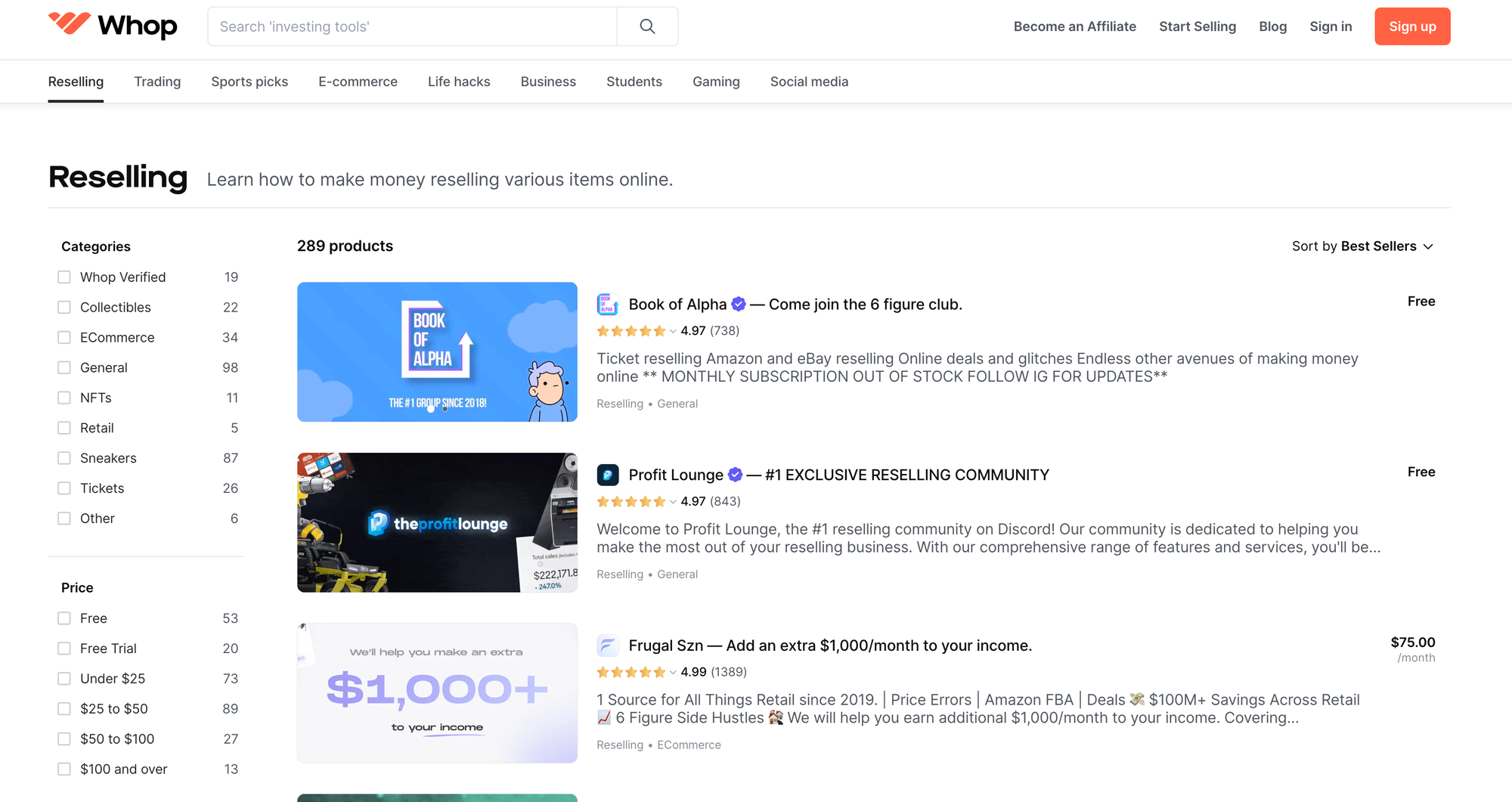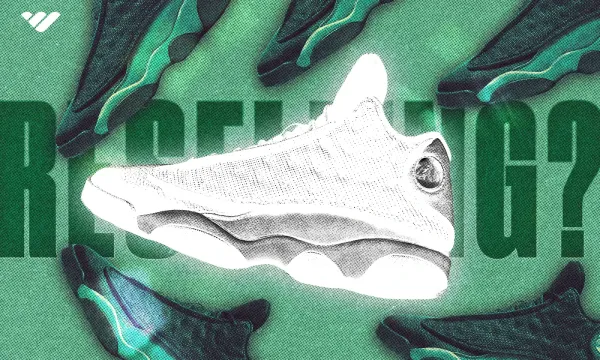The entrepreneurial journey of making money online can prove to be a difficult one, primarily due to the information overwhelm from so many different avenues to take, all with their own promises.
Reselling is one such avenue that offers potential for seemingly easy profits, but you must have the valuable skills of sourcing broadly and selling quickly. For those in the know, reselling remains one of the best entries into ecommerce and entrepreneurship in 2024 - even if you have no previous experience.
Let’s go over what reselling is, and address one of the biggest questions surrounding the topic–is reselling legal?
What is Reselling?

Reselling is a term used to describe taking an existing product and selling it again to a new buyer. It is a form of retail arbitrage, and while it can be profitable, in order to make a profit, one has to consider additional fees that will cut into the potential profit margin, which include shipping, packaging, and other platform fees.
What is a Reseller?
A reseller is an individual or a business that sources existing products from multiple channels with the goal of selling at a profitable price point to their own customer base. They do not create products themselves, but sell existing products, typically brand-name or well-known products.
The main service that a reseller provides to their customers is curating inventory, organizing it, and making it easily accessible to customers who might not otherwise find the products that they stock.
Additionally, resellers sometimes acquire product in bulk directly from the supplier, meeting a minimum order quantity (MOQ) that most people won’t meet otherwise.
Resellers promote the product on their storefront, which is typically hosted online due to the rise of ecommerce and convenience of third-party store platforms, although their stores can also have a physical presence.
Examples of reselling stores include:
- A vintage clothing store
All vintage clothing stores are resellers, as they acquire, curate, and sell existing brand-name clothing within the context of their own storefront at a profitable price. The value they provide is the curation of their goods, and they attract customers through branding and quality selection of clothing. Vintage clothing stores are one of the few reselling stores that might work better in person rather than online. - A dropshipping store
While it typically doesn’t involve selling brand-name products, dropshipping is a popular form of reselling where the business owner relies heavily on marketing, serving advertisements to the right audience to make sales of a product that is often generic but at the same time unique. An example of a popular item in the dropshipping niche is an astronaut star ceiling projector. - An Amazon FBA/FBM Seller
Although some Amazon sellers, known as private label sellers, create original product, a large number of sellers on the platform are in fact resellers of existing brand name goods. Amazon manually approves all individual resellers for each brand name product and category that they choose to sell, keeping the quality standard for sellers on their platform high.
How do Resellers Make Money?

In order to make money as a reseller, one must systematically source inventory and create a storefront in which they can sell their product at a price that leaves room for profits. Additionally, they must remain compliant with any platform or regional rules or regulations, all while being ready to potentially deal with losses from inventory that doesn’t move as expected.
Here’s a full list of what a reseller must do to create a profitable reselling business:
- Source Inventory Profitably
Sourcing profitable inventory is the secret sauce in the recipe of any successful reseller, and to do this successfully, one needs to do thorough research and act quickly. Prospective resellers also need to be always searching for new sources of profitable inventory as old sources could become irrelevant due to stock outage or oversaturation. - Effectively find qualified buyers
Acquiring inventory is worthless if you don’t have buyers that can cash you out. Finding consistent buyers is a necessary component of reselling, and one must potentially use multiple platforms and methods to move inventory to buyers profitably. - Sell the item at a high enough margin
Even if you are great at sourcing inventory and finding buyers, you still need to make a profit to have a viable business, and in order to do so, you need to consider your overall profit margins while taking all expenses into account. This will include shipping, packaging, and potential platform fees if you are selling on Amazon, eBay, or another third-party platform. - Be ready for potential losses and liquidation
Having a 100% win rate in terms of moving sourced inventory profitably is the goal in reselling, but it doesn’t always happen. There might come a time when it is necessary to move inventory at a loss, which is often done through liquidating in bulk. - Stay compliant with any local laws or licensing requirements
While some operate like it is, reselling isn’t a total free-for-all, especially because you are dealing with name brands that might have their own rules and restrictions around reselling their products, in addition to any regional requirements which may include getting proper licensing or business structure.
Is Reselling Legal?
To answer the question quickly, reselling an item that you have purchased is perfectly legal, as you are the owner of the item and can do whatever you please with it. In the United States, the Supreme Court has reinforced in multiple cases that individuals are free to resell items that were lawfully purchased.
However, the answer is not so clear-cut in some cases.
Even if reselling is technically completely legal, there could be barriers that discourage its practice.
For example, even though it is impossible for Nike to make reselling their products illegal, they have updated their terms of service to include the right to cancel any order that appears to have been purchased for the sole purpose of reselling. Nike has been vague about its stance on resellers in the past, so this formal announcement of rules for resellers had many sneaker resellers worried about whether or not their business could remain viable.
Secondly, if you want to scale your business, getting a reseller permit or reseller certificate can be beneficial. Holders of this certificate can be exempt from paying sales tax on goods purchased for resale, as sales tax will be collected as the items are sold individually. This is especially relevant to resellers who buy their product in bulk. While having a reseller permit or reseller certificate isn’t necessary to make your reselling business legal, it is certainly worth considering, especially since it can be had at a nominal cost and is in some cases it is free to acquire.
Is Ticket Reselling Legal?

Ticket reselling is legal yet can come with many rules and regulations, so it is best to check your local laws. Reselling tickets remains one of the most controversial areas of reselling.
Most notably, in November 2022, Taylor Swift fans loudly voiced their negative experience with trying to buy tickets for Taylor Swift's Eras US tour. These tickets were only available on Ticketmaster, which is a popular platform for ticket resellers, who flooded the platform with bots and excess traffic, rendering it impossible for ordinary users to acquire tickets for personal use.
Although 2.4 million tickets were sold, the vast majority of those millions of tickets were sold at retail to ticket resellers whose intention was only to profit. This event in particular reignited the already controversial topic of whether or not ticket reselling or scalping should be made illegal, especially in the concert industry, but the outcome of the debacle had no changes on the legality, as ticket reselling remains legal.
However, a number of states in the US outlawed the use of ticket-scalping bots, and fans filed a federal class action lawsuit against Ticketmaster, which also successfully fought for the Federal Trade Commission to impose a federal ban on deceptive or surprise fees, with a requirement for platforms like Ticketmaster to show consumers all fees upfront, including any markups above the original ticket price.
How Do I Resell Legally?
Here are some examples of what you should do so you can avoid any potential consequences when operating a reselling business.
- Read up on the latest terms and services of a company whose product you intend to resell
Some brands, like Nike, will have fine print that discourages reselling in such a way that might impact your business in the form of canceled orders or being banned from the platform. Be sure to get familiar with any rules or terms and services that a company might have for those that intend to resell their brand name goods. - Properly license your business to be set up to resell
While it isn’t totally necessary in the beginning to set up and license a business for reselling, especially if you are just selling items occasionally on a platform like eBay, if your intent is to scale then you should prepare your business from the get-go. This means properly registering and licensing your business by getting a reseller permit, also known as a reselling certificate or a sales tax resale certificate. - Read up on platform rules so you can be approved to resell your items and brands
If you are selling on a platform like Amazon, there are stringent rules as to which sellers are able to resell brand names. For Amazon in particular, since their seller standards are high, one needs to be ungated or approved to sell most brand names or item categories. Make sure you read up on how you can get approved to sell the product you intend to resell on whatever your chosen platform is. - Ensure that your product is fully authentic
One thing that overlaps with reselling that is totally illegal is the selling of counterfeit goods or those that infringe on trademarks. Be sure to thoroughly vet your supplier to ensure the product they are selling you is authentic, especially if the price is too good to be true.
Join a Reselling Group on Whop

Starting the journey as a reseller alone is possible, however, it will likely be full of trial and error that might cost you unnecessary time and money spent. Going solo means that you dedicate a considerable amount of time to researching the latest product trends, understanding reselling conditions and law, and learning best practices. This can be overwhelming and unnecessarily intricate, potentially complicating what could become a lucrative business.
👉 Rather than setting off on the journey alone as a beginner, join a group where expert resellers share their veteran advice and guidance. Check out one of the many private reselling Discord communities, the best of which you can find right here on the Whop marketplace.
📚 Read next: Whop's Best Reselling Discord Servers
FAQs
When is it a problem or illegal to resell?
Although reselling a product rightfully acquired by you as a compliant consumer is completely legal, you might encounter issues or even cross legal lines if you aren’t careful in some situations. An example of such a situation is the overt use of bots to assist your purchase of tickets, which is illegal in some regions, or clearly ordering with the intent to resell from Nike which could cause a canceled order. It is also illegal to resell stolen or counterfeit product.
What products am I allowed to resell?
As long as you are the rightful owner of a product that you paid for, you are allowed to resell any product in a category that is allowed publicly. Examples of items you can’t resell without special permits or authorization can include firearms and medical devices.
How much money can I make as a reseller?
While it is impossible to put an exact figure on how much you can earn as a reseller, the amount of money you make will be dependent on a number of factors including the quality and pricing of your sourced inventory, the volume at which you are selling, and the profit margins of your products, and most importantly, the time and dedication you have to commit to your business. Some resellers treat their business like a part-time side hustle making a few hundred dollars per month or year, and other resellers scale to seven-figure revenue levels annually.
What is the difference between reselling and retail arbitrage?
Reselling is a form of retail arbitrage, so in some cases like in the reselling of brand name products, the term can be interchangeable, particularly if you are purchasing the item on one platform and selling it on another. However, in the case of dropshipping a no-name product, this is only considered reselling and not retail arbitrage.
What is the difference between dropshipping and reselling?
If you are running a dropshipping business, by definition you are a reseller. Thus, dropshipping is simply one of the many forms of engaging in a reselling business. Additionally, dropshippers do not hold inventory or physically fulfill orders.
Which are the best products to resell?
The best product to resell is one that has a high demand that you are able to secure at a much lower price than the going market rate. The exact product will vary based on your knowledge and the niche you are engaging in and is always subject to change, so to find the best product to resell, you will also need to be familiar with market trends. For example, reselling Air Jordans used to be quite profitable and an excellent industry to engage in during the mid-2010s, but they dropped in popularity and became saturated later that decade, and encountered a resurgence in 2020 for a short time.


![Top 18 best ticket reselling Discord servers [November 2024]](/blog/content/images/size/w600/2023/12/Top-Ticket-Reselling-Discord-Servers--1-.webp)
![Top 22 best sneaker reselling Discord servers [2024]](/blog/content/images/size/w600/2024/01/sneaker-reselling-discord.webp)
![Top 26 best reselling Discord servers [November 2024]](/blog/content/images/size/w600/2023/09/reselling-discords.webp)
